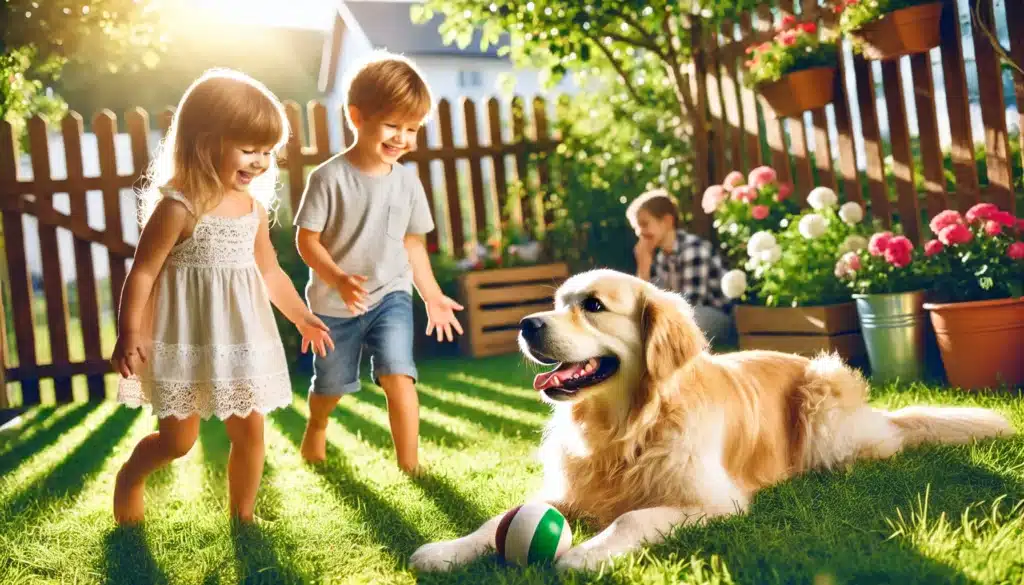Golden Retrievers are not just one of America’s most beloved dog breeds; they are also a testament to the importance of socialization in a dog’s development. As these dogs grow, ensuring they are well-socialized can help prevent over-excitement and various behavioral issues. This article delves into the unique characteristics of Golden Retrievers, the critical role of socialization, and best practices for achieving a well-rounded companion.
The Importance of Socialization for Golden Retrievers: Preventing Over-Excitement in Young Dogs

1. Understanding the Golden Retriever Temperament
Golden Retrievers were originally bred in Scotland for retrieving game during hunting. This history has instilled in them a friendly and sociable nature, making them excellent family dogs. They thrive on interaction with humans and other dogs, which is why they consistently rank among the top family dog breeds in various surveys.
However, their friendly disposition comes with high energy levels. Golden Retrievers require at least an hour of exercise daily to release pent-up energy and maintain a healthy state of mind. Without adequate physical activity, their energy can quickly escalate into over-excitement, which manifests in behaviors such as jumping, barking, or even destructive tendencies at home.
Moreover, Golden Retrievers are particularly sensitive to their environment. They respond well to positive experiences but can also be easily overwhelmed by loud noises or chaotic situations. It’s important for owners to create a nurturing environment that allows these dogs to feel secure and confident.
2. The Role of Socialization in Development

Socialization is crucial during the critical period of development, which for Golden Retrievers is between 3 to 14 weeks of age. During this time, exposure to various stimuli can significantly influence their behavior in adulthood. Studies have shown that puppies who experience a wide range of environments, sounds, and interactions develop into more confident and well-adjusted adults.
Golden Retrievers benefit from exposure to different people, animals, and scenarios. Environments such as dog parks, busy streets, and community events provide excellent opportunities for socialization. Positive experiences in these settings can help prevent future fears and anxieties related to unfamiliar situations.
Incorporating positive reinforcement techniques during socialization is also vital. Simple rewards such as treats or verbal praise can encourage desirable behaviors. For instance, if a Golden Retriever remains calm in a crowded environment and receives praise, they will be more likely to repeat this behavior in the future.
3. Consequences of Poor Socialization
On the flip side, lack of proper socialization can lead to significant behavioral issues. One major consequence is over-excitement and hyperactivity. Golden Retrievers that haven’t been adequately socialized may exhibit signs of over-stimulation, such as excessive barking or jumping, particularly in new environments. Experts often note that a lack of early exposure can lead to reactive behaviors in adulthood.
Furthermore, insufficient socialization can result in fear-based reactions or even aggression. Studies indicate a direct correlation between socialization and the propensity for aggressive behaviors. A Golden Retriever that has not been properly socialized may react defensively to unfamiliar situations or people.
These behavioral issues can impact the bond between dogs and their families. Many owners have shared experiences of frustration due to their Golden Retriever’s hyperactivity or anxiety. As one owner put it, “I wish I had socialized my puppy better; it would have saved so many stressful moments.”
4. Best Practices for Socializing Golden Retrievers

Creating structured socialization experiences is vital for Golden Retrievers. This can involve controlled introductions to other dogs and people, ensuring that interactions remain positive and safe. Gradually increasing the complexity of these experiences—starting from quiet environments to busier locations—can help puppies adapt more effectively.
Enrolling your Golden Retriever in puppy classes can also be highly beneficial. These classes not only provide structured socialization opportunities but also offer training that can significantly reduce behavioral issues. According to recent statistics, dogs that complete puppy training courses are less likely to exhibit problematic behaviors later in life.
It’s essential to recognize that socialization is not just a puppy phase; it is an ongoing process. As your Golden Retriever matures, continue seeking opportunities for socialization. This might include regular outings to dog-friendly events, visits to the dog park, or even interactions with new friends and family members.
5. Resources and Support for Owners
For owners seeking further support on socialization strategies, consulting professional trainers and behaviorists can be invaluable. Many organizations, such as the Association of Professional Dog Trainers (APDT), provide databases where pet owners can find certified professionals.
Local community resources, such as dog parks and meetup groups, can also play a significant role in socialization. Engaging with fellow Golden Retriever owners can provide insights and experiences that might benefit your training efforts. Online forums and social media groups dedicated to Golden Retrievers are excellent venues for sharing tips and best practices.
Additionally, educational materials such as books and online courses can enhance your understanding of Golden Retriever training and socialization. The American Kennel Club (AKC) offers a wealth of information tailored to various breeds, including Golden Retrievers. Explore resources like “The Complete Guide to Golden Retrievers” for a deeper dive into training and care.
Conclusion
In conclusion, the importance of socialization in preventing over-excitement in Golden Retrievers cannot be overstated. By understanding the breed’s temperament and implementing effective socialization strategies, owners can foster happy, well-adjusted dogs that thrive in family environments. With proactive approaches to socialization, you can ensure that your Golden Retriever grows into a confident and beloved member of your family.




